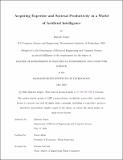Acquiring Expertise and Societal Productivity in a World of Artificial Intelligence
Author(s)
Gupta, Diptasri
DownloadThesis PDF (675.8Kb)
Advisor
Atkin, David
Terms of use
Metadata
Show full item recordAbstract
This thesis investigates the impact of automation and advanced technologies, specifically focusing on Large Language Models (LLMs), on traditional employment structures in the modern workplace. Historically, the master-apprentice model has been integral to vocational training across various industries, facilitating the transfer of knowledge, skills, and professional ethics from one generation to the next. However, the rise of AI and machine learning challenges the viability of this model, raising critical questions about the nature and quality of mentorship and skill acquisition in work environments. Part of a broader research initiative led by Professors Atkin, Li, and Beraja, this study explores the hypothesis that apprentices promoted without foundational mentorship may struggle in their advanced roles, potentially reducing long-term productivity gains from AI. Utilizing a comprehensive dataset from Brazilian Social Security records (RAIS) spanning 2003-2015, the research focuses on industries with a clear apprentice-master dynamic, such as finance, legal, and insurance sectors. By analyzing job code changes and pay adjustments, the study aims to correlate technological influx within companies with the productivity of workers promoted to master roles, using pay as a proxy for productivity. Findings indicate that while technological influx does not significantly affect immediate post-promotion wages, it negatively impacts wages one and two years after promotion, suggesting potential wage stagnation or reduction. Additionally, technological influx initially increases promotion likelihood and stabilizes employee retention, though longer-term effects are less clear. These results imply that apprentices are more likely to be promoted and retained in the short term but face reduced wage growth and potentially diminished performance. The study concludes that technological advancements can alter the traditional apprenticeship model, affecting skill acquisition and long-term productivity. Recommendations are provided for educators, industry leaders, and policymakers on optimizing apprenticeship models in an increasingly automated world. Further research will involve AI-focused evaluations to observe the real-world impact of AI integration on team dynamics, productivity, and skill development, aiming to refine our understanding of its effects on employment structures.
Date issued
2024-05Department
Massachusetts Institute of Technology. Department of Electrical Engineering and Computer SciencePublisher
Massachusetts Institute of Technology